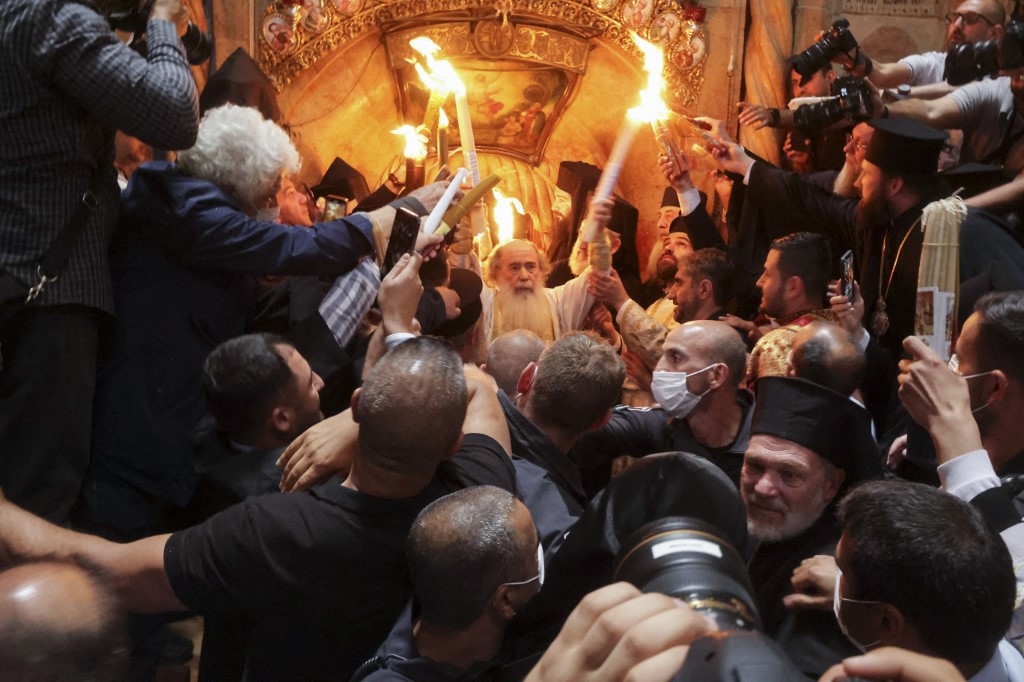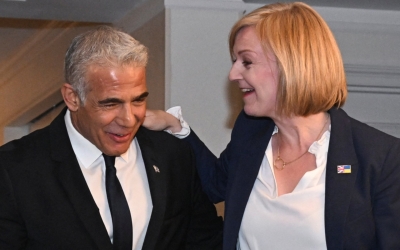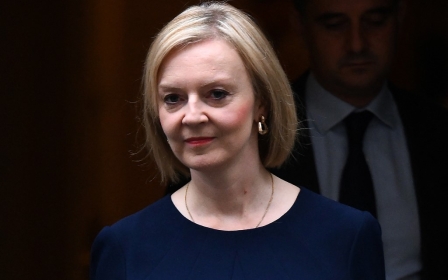UK embassy in Israel: Christian leaders in Jerusalem warn move would harm peace process

Christian church leaders in Jerusalem have warned against British government plans to relocate the UK embassy in Israel to the city from Tel Aviv, saying such a move would be a “further impediment to advancing the already moribund peace process”.
The Council of the Patriarchs and Heads of the Churches in Jerusalem said in a statement on Monday that it had noted “with grave concern the recent call” of Liz Truss, the new British prime minister, to review the embassy’s location.
“This directive was in response to the request of the Conservative Friends of Israel, who seek to have the embassy moved from its present location in Tel Aviv to a new site in Jerusalem,” the church leaders said.
Back in the UK, two Jewish community groups have also expressed their opposition to the plan.
Since 1967, the British government has recognised East Jerusalem, along with the rest of the West Bank and the Gaza Strip, as occupied territory. While Israel views the entire city as its undivided capital, the Palestinians claim the occupied eastern part as the capital of their hoped-for future state.
New MEE newsletter: Jerusalem Dispatch
Sign up to get the latest insights and analysis on Israel-Palestine, alongside Turkey Unpacked and other MEE newsletters
As recently as December 2021, the UK’s political coordinator at the UN affirmed Britain’s longstanding position on the status of Jerusalem, which is that “it should be determined in a negotiated settlement between the Israelis and the Palestinians”.
But while Conservative prime ministers from Margaret Thatcher to Boris Johnson have upheld this position, Truss, who calls herself a “huge Zionist”, has pledged to review the location of Britain’s embassy in Israel.
At a meeting with her Israeli counterpart Yair Lapid on the sidelines of the United Nations General Assembly in September, Truss said she was considering moving the embassy from Tel Aviv to Jerusalem.
On 30 September, Conservative Friends of Israel, a pro-Israel lobby group, issued a briefing note to Conservative MPs making the case for the embassy move to Jerusalem, which would follow that announced by the US government of Donald Trump in 2017.
Theresa May, the UK’s prime minister at the time, strongly condemned Trump’s decision.
The briefing note said that the British government already owns land in West Jerusalem earmarked as the site of a new embassy in Israel and claimed that the move from its current location in Tel Aviv would be “a bureaucratic one that recognises the reality on the ground”.
'Continuing military occupation'
In its statement, the Council of the Patriarchs and Heads of the Churches said that a British embassy move would “severely undermine the key principle” of corpus separatum, which relates to Jerusalem’s special status as a city holy to Christians, Jews and Muslims alike.
Jerusalem’s church leaders said that “the very act of reviewing the placement of the British embassy not only suggests that negotiated agreements regarding Jerusalem and the West Bank have already resolved the ongoing disputes between the involved parties - when in fact they have not - but also implies that no such negotiations are needed: that the continuing military occupation of those territories and the unilateral annexation of East Jerusalem are both acceptable.”
The intervention from the Council of the Patriarchs and Heads of the Churches is the latest in a slew of denunciations of any UK embassy move to Jerusalem from Christian leaders at home and abroad.
A spokesperson for Justin Welby, the archbishop of Canterbury, told Middle East Eye last week: “The archbishop is concerned about the potential impact of moving the British Embassy in Israel from Tel Aviv to Jerusalem before a negotiated settlement between Palestinians and Israelis has been reached.”
Opposition to move from Jewish groups
Some Jewish community groups have also expressed opposition to any move.
In a statement on Sunday, the Movement for Reform Judaism said it was committed to "two viable states as the only just and realistic solution to the present situation. Consequently, we would caution against the government taking action that might undermine peace in the region."
The Movement for Reform Judaism represents about a fifth of synagogue affiliations in the UK and describes itself as "unequivocally Zionist".
Yachad, a British Jewish advocacy organisation campaigning for a political resolution to the Israel-Palestine conflict, last week called on its supporters to write to the president of the Board of Deputies, the main organisation representing Jews in the UK, to oppose calls for the embassy to be moved.
Speaking at a Board of Deputies event at the Conservative party conference last week, Marie van der Zyl called for the embassy to be relocated to Jerusalem.
Yachad said: "Her call to action took place without warning or consultation from the community or deputies.
"Both Israelis and Palestinians consider Jerusalem to be their capital. The permanent status of Jerusalem must be agreed as part of a political resolution, as set out in the Oslo accords.
"We must be part of the solution - not add to the problem."
Middle East Eye delivers independent and unrivalled coverage and analysis of the Middle East, North Africa and beyond. To learn more about republishing this content and the associated fees, please fill out this form. More about MEE can be found here.





